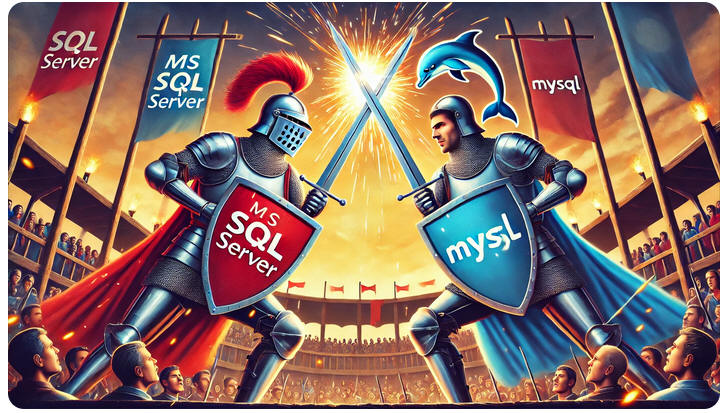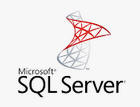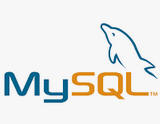

By: Hassan Shareef,
Database Administrator
Since 16 years
When it comes to relational database management systems (RDBMS), MS SQL Server and MySQL are two of the most widely used platforms. Both are robust, reliable, and powerful, but they cater to different use cases depending on organizational needs, budget, scalability, and technical expertise. Understanding when to use each can help businesses and developers make informed decisions. This article explores the key factors to consider when deciding between MS SQL Server and MySQL.

 Microsoft SQL Server, developed by Microsoft, is a proprietary RDBMS
designed for enterprise-level applications. It is known for its seamless
integration with other Microsoft products, advanced features, and support
for complex database architectures.
Microsoft SQL Server, developed by Microsoft, is a proprietary RDBMS
designed for enterprise-level applications. It is known for its seamless
integration with other Microsoft products, advanced features, and support
for complex database architectures.
 MySQL, developed by Oracle, is an open-source RDBMS that is widely used
for web applications, small to medium-sized businesses, and startups. Its
simplicity, flexibility, and cost-effectiveness make it a popular choice
among developers.
MySQL, developed by Oracle, is an open-source RDBMS that is widely used
for web applications, small to medium-sized businesses, and startups. Its
simplicity, flexibility, and cost-effectiveness make it a popular choice
among developers.

MS SQL Server is a great choice for enterprises and organizations requiring robust, enterprise-grade database management. Here are some scenarios where it shines:
If your organization needs a highly scalable database system to support large volumes of data and transactions, MS SQL Server is the ideal choice. It handles complex queries, data warehousing, and BI workloads efficiently.
Organizations already invested in the Microsoft ecosystem will benefit from SQL Server’s seamless integration with tools like Azure, Power BI, and Visual Studio. This integration enhances productivity and simplifies workflows.
For industries like finance, healthcare, and government, where data security is paramount, SQL Server’s advanced encryption features and compliance with regulations like GDPR and HIPAA make it a strong contender.
If your organization relies heavily on data analytics and reporting, SQL Server’s BI tools (SSRS, SSAS, and SSIS) provide a comprehensive solution for extracting insights from data.
SQL Server’s high availability and disaster recovery features ensure minimal downtime for mission-critical applications. Features like Always On Availability Groups make it reliable for applications where uptime is crucial.
MySQL’s simplicity and cost-effectiveness make it an excellent choice for small to medium-sized projects and web applications. Here are scenarios where MySQL is a better fit:
For startups and small businesses operating on a tight budget, MySQL’s open-source community edition provides a free yet powerful database solution. The enterprise edition is also more affordable compared to MS SQL Server.
MySQL is widely used in web development, particularly in combination with the LAMP stack. It’s optimized for web environments, making it the default choice for content management systems (CMS) like WordPress, Joomla, and Drupal.
Applications with heavy read operations, such as e-commerce websites, benefit from MySQL’s high performance and optimization for read queries.
If you’re working in a mixed operating system environment, MySQL’s cross-platform compatibility ensures smooth operation across different systems.
MySQL’s ease of use and wide community support make it an excellent choice for developers. Its straightforward setup and extensive documentation reduce the learning curve.
| Criteria | MS SQL Server | MySQL |
|---|---|---|
| Cost | Proprietary, license required | Open-source, free community edition |
| Ease of Use | Advanced setup and administration | Simple setup and minimal maintenance |
| Scalability | Highly scalable for enterprise use | Suitable for small to medium-sized applications |
| Performance | Optimized for mixed workloads | Optimized for read-heavy workloads |
| Integration | Excellent with Microsoft tools | Limited integration options |
| Security | Advanced features (e.g., TDE, Always Encrypted) | Basic security features |
| Target Audience | Enterprises and large organizations | Startups, SMBs, and web developers |
The choice between MS SQL Server and MySQL ultimately depends on your project requirements, budget, and technical needs. MS SQL Server excels in enterprise-grade applications, advanced security, and business intelligence, making it ideal for large organizations with complex workloads. On the other hand, MySQL’s simplicity, cost-effectiveness, and optimization for web applications make it a popular choice for startups and small to medium-sized businesses.
Understanding the strengths and limitations of each platform ensures you select the right database system for your specific use case, helping your organization achieve its goals effectively.